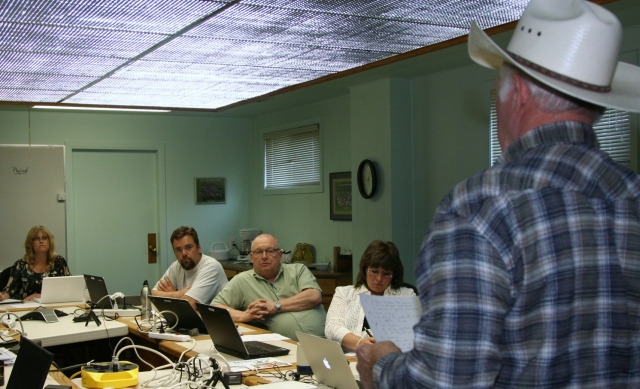EDUCATION BEAT: Travel subsidy revisited, Board chair congratulated
School District 51 board chair Teresa Rezansoff has been recognized for her years of service, experience and insight with a re-election and two government appointments.
Rezansoff was re-elected for her second one-year term as the vice president of the BC School Trustees Assocation (BCSTA). This will be her ninth year as a member of the BCSTA board of directors.
She has also been appointed for a three year term by the Minister of Education, George Abbott, to the first BC Teachers’ Council (BCTC) and the Disciplinary and Professional Conduct Board (DPCB).
Travel subsidy revisited
Although it has been two years since the travel subsidy was cancelled, parent Bruce Baker revisited the issue at the May board meeting.
Baker, who lives on a rural acreage between Greenwood and Midway, has a 15 year-old son who goes to Boundary Central Secondary School. The school bus will not pick up his son because the road is gravel, which means Baker has to drive him to the closest bus stop every morning. The trip is 5 km long and his son has few alternatives — biking is limited to fall and spring and snowmobiles are illegal on the road, said Baker.
“The present situation is that parents get nothing and trustees still get 53 cents a kilometer,” said Baker to the board.
“I think the travel subsidy should be reinstated and increased. It was a big mistake taking the subsidy away.”
The subsidy was stopped two years ago when kindergarten moved from a half day program to a full day one, said superintendent Michael Strukoff during a telephone conversation after the meeting.
The district used to pay out between $3,500 and $4,000 in subsidizes annually. It was used to help parents who had children in half day kindergarten and had to pick their child up because there was no bus running in the middle of the day, he said.
“When we went to an all day kindergarten, a lot of families wouldn’t need (the subsidy) and we took this as an opportunity to phase it out,” he said.
Buses don’t drive off asphalt roads for safety reasons, said Strukoff.
“A certain percentage of us have to live out there (rurally) to make life better for you to live in town,” said Baker. “I think you should be helping us to get our kids to school … If you want to cut back, at least cut it fairly.”
Trustees are subsidized for their travel expenses. They get 53 cents a kilometer, which helps pay for both the fuel expenses and wear and tear on their vehicles much like any government employee would be paid.
Board chair Teresa Rezansoff said the board will consider Baker’s request and get back to him.
Superintendent, director of instruction and principal set for retirement in 2013
Michael Strukoff, superintendent of schools, Maxine Ruzicka, director of instruction and Louise Bayles, principal of Boundary Central Secondary School have announced they will be retiring as of July 2013.
Teresa Rezansoff, board of education chairperson, said the advanced notice is much appreciated in light of the District Design 2013 the school district is currently planning for.
Last day of school for GFSS changed to June 19
Grand Forks Secondary School students will see a few extra days of instruction at the end of the school year due to changes made to required exams, including less exams days needed.
This year the last instructional day will be Tuesday, June 19 not the previous Thursday, June 14. There will be six examination days to follow the last day of instruction.
Students at Boundary Central Secondary School will continue on with their original schedule.
Bill 36 to create new learning opportunities in local schools
Under Bill 36, which was passed in the BC legislature on April 26, students in Kindergarten to Grade 9 will now be able to take a combination of online and traditional school courses.
While this school district is unsure of how this will look in our local school system, the board feels this bill will bring about positive learning opportunities for students.
“Flexibility is what Bill 36 is really addressing in the five pillars of BC Education,” said SD51 school superintendent Michael Strukoff during the talking break portion of the May board meeting.
While distributed learning is not a new concept — Grade 10 to 12 students often do both — it is new for the lower grades to do it.
The way funding can work under this new system remains unclear. At this time students are classified as full time equivalent (FTE) and funded based on being in school full time. A student cannot be funded in more than one school.
“It’s not a very long bill but it had some interesting implications but we’ll have to see it enacted to see the full implications,” said Strukoff.
“I think we need to recognize that legislation is not just for the now but will be impacting us for awhile,” said board chair Teresa Rezansoff. “We can evolve and take advantage of the new options available to us.”
“Kids who can excel aren’t always given the opportunity,” said trustee Cathy Riddle, about the opportunities the new bill may have for local students.
Boundary District Teachers’ Association president Norm Sabourin expressed concern over how this new flexibility will be used in terms of longer school days or larger classes for teachers.
“My worry is bigger schools could be a problem,” said Sabourin.
“The length of the existing day I don’t see going longer,” said Strukoff. “The hours of instruction will remain the same, (the bill) is just allowing us to organize it differently. We can expand on delivery but not hours.”






















